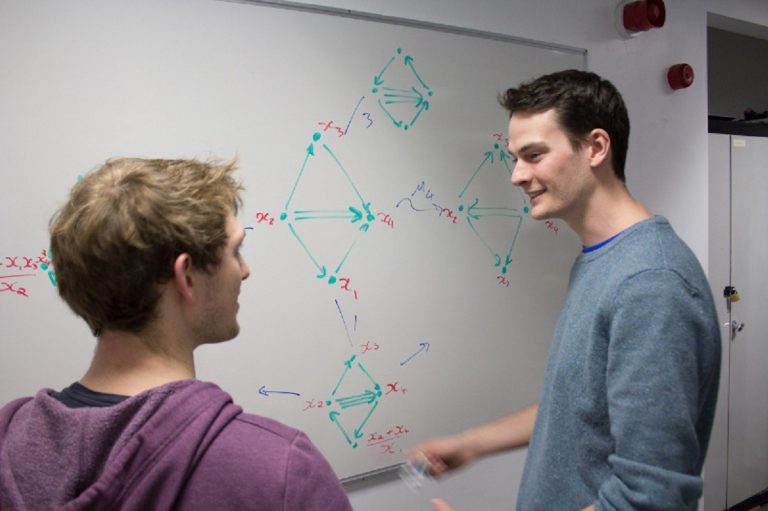
“As part of this vision we see a key role for Durham University in delivering innovation and technology transfer, as well as encouraging students to develop skills in key STEM subjects, that will be vital to the future prosperity of the region and the country.” – Professor Anthony Long, Deputy Vice-Chancellor and Provost
Earlier this year, the UK’s digital sector was hailed as one of the nation’s greatest triumphs.
According to the Tech Nation 2017 Report, the UK’s digital field is expanding at twice the rate of the wider economy, creating a wealth of highly-skilled and impressively well-paid jobs, with the nation’s tech workers said to be earning on average 44 percent more than non-UK tech-based employees.
“Today more than 1.5 million people are already working within the digital sector, or in digital tech roles across other sectors.” said Prime Minister Theresa May. “We will expand the scope of our digital tech industries, funding Artificial Intelligence, robotics, 5G, smart energy and more.”
But the opportunities don’t stop there, with May also stating, “We will broaden their reach across the UK, create new Institutes of Technology, and reinvigorate STEM and digital education to equip young people for the work places of the future.”

The future has never looked so bright for UK STEM disciplines, with world-class institutions such as Durham University presenting students with an unrivalled pathway into STEM-related fields. Durham’s Faculty of Science offers a diverse programme portfolio that covers the BioSciences, Earth Sciences, Engineering, Mathematics, Computer Science, Chemistry, Natural Sciences, Physics and Psychology.
As a recognised pioneer of UK STEM education, Durham’s Faculty of Science boasts a number of global accolades, including a Top 50 World ranking for Earth Sciences by QS; not to mention its outstanding positions in the Times Higher Education (THE) 2017 subject rankings, in which Chemistry places 3rd; Physics places 4th; Computer Science places 5th; Engineering places 5th; Geology places 5th; and Psychology places 7th.
With the majority of specialised employers stating that work and practice-led experience offers a ‘springboard’ for recent graduates to step into their respective professions, Durham does everything it can to provide an experiential learning journey for all students, finding particular success within its Department of Mathematics, as well as Engineering and Computer Science.
The school’s unique Industrial Partnership Committee (IPC), for example, fosters strong industrial links with global and notable engineering and information technology companies. Above all, the IPC strives to nurture relationships with corporations who hold research interests that overlap with Durham’s own pursuits. A partnership with DONG Energy, for instance, resulted in funding of over £1 million to endow a Chair in Renewable Energy, while research within energy delivery and computational geomechanics has inspired a partnership with Ikon Science, who have part-funded a lectureship in return.
On top of this, Durham University’s Solar Car Team (DUEM) serves as an example of how students here are urged to put what they learn into practice in ways enriched with creativity and innovation. Here, students take on the challenge of designing a solar car, which is then entered into global competitions, with Engineering and Physics students taking on the roles of designing and crafting the car. But what gives Durham students an edge is that those from courses like Business and Economics are also asked to compete, planning and promoting the car’s importance to powerful industry players.
Opportunities like the DUEM, plus those available through the IPC and beyond, are part of what motivated Jeff Weedman, Procter & Gamble Global Business Development Vice President, to present Durham as a global leader in multidisciplinary research in the US Congress, naming the institution as the ‘exemplar’ for industrial engagement in higher education.

Source: Durham University
But research options and industry interactions are beneficial to students in plenty more ways than one, and Durham is a testament to this. Here, students have unparalleled access to placements with global heavyweights such as BP, allowing them to forge a professional network and hone their employability long before they graduate.
“Taking part in the research project was a great opportunity,” says Jenny Wilcox, a Geology student from Durham who pursued the placement with BP. “I worked with machines so advanced that three months ago I didn’t know they existed, learned the ins and outs of stable isotope research, and got to work alongside some of the biggest names in geochemistry,” she adds. “The internship provided me with a clearer picture of what to focus on for the rest of my degree.”
For many prospective students, the primary draw for studying science is seeing the findings of their work make a positive difference on the wider world. But science students at Durham don’t have to wait until after graduation to see their influence take effect, with the Science into Schools module series giving students a chance to see exactly what it’s like to teach science to young potentials with a keen interest in the field.
Durham’s student-led research has real-world impact in numerous ways, with Durham’s entire faculty investing in the topics that matter to our lives. The Department of Mathematics, for example, has made a tangible difference to society in a number of ways, from its changes to risk assessment guidance and practice, which directly influenced the management of ecotoxicological risk in the EU; to its statistical modelling for digital marketing that has revolutionised the way pay-per-click advertising can be optimised.
Through innovative and comprehensive initiatives such as these, Durham is not only helping broaden our understanding of the scientific world, but also inspiring future trailblazers in the global STEM field.
During his visit to the University, Chancellor of the Exchequer, Philip Hammond, described Durham as “a wonderful example” of how exciting disciplines like Maths, Science and Engineering can be “brought to life, taught to the next generation of talented professionals, and shared with all those keen to engage with such important subjects”.
There’s no better time than now for you to get involved.
Follow Durham on Facebook, Twitter, YouTube, WordPress, Instagram, Weibo and LinkedIn
Liked this? Then you’ll love these…
8 reasons to choose Durham University
Benefits of studying humanities and social sciences in the UK







